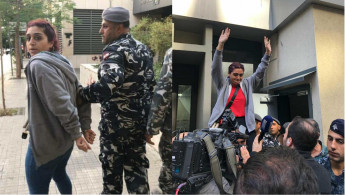Detained Lebanese protester released after claims of police harassment sparks outrage
Dana Hamoud was detained on Friday evening after a confrontation with a policeman during a protest in front of Beirut's Central Bank, The Daily Star reported.
A video widely circulated on social media showed Hamoud being restrained by a police officer who pushed her to the ground as she fought back.
The protester's overnight detention sparked outrage among fellow demonstrators after activists and friends alleged Hamoud had been arrested after the police harassed and lobbed sexual insults at her.
Those claims have been rejected by Lebanon's Internal Security Forces (ISF), which said in a statement on Saturday that Hamoud had assaulted a police officer and vehicle.
Rather than stemming from police harassment, the security forces said the altercation began when Hamoud attempted to block the path of a police car trying to leave the area, leading to "the intervention of a first lieutenant who tried to calm her".
|
|
Other reports indicate the incident began after a police car allegedly crashed into a motorcyle near the Central Bank. Al-Akhbar reported that a police officer harassed one female protester, with attempts by Hamoud and others to make him apologise ultimately leading to Hamoud's detention.
Addressing a crowd that had gathered earlier outside Ashafieh police station to demand her release, the released protester said: "I respect anyone who respects me. But if anyone, whoever it may be, puts their hand on me, I will defend myself."
Caretaker Interior Minister Raya El Hassan urged Lebanese protesters to remember the "pressure" on the security forces and that they are "worried about their families, like you".
"If they did wrong, the judiciary will hold them accountable," she said in a tweet.
Read more: Lebanon's Ponzi scheme economy is broken. Protesters want the wealthy 1% to foot the bill
Demonstrators gathered on Saturday outside the Central Bank's headquarters in Zahle, Lebanon's third largest city, to protest against banking policies that they believe have deepened the country's ongoing financial crisis.
Lebanon's mass protest movement erupted in mid-October with initial demonstrations targeting a proposed tax on WhatsApp calls. The protests have since moved on to target errant corruption and the country's entrenched, sectarian political elite.
Many demonstrators have targeted banks and financial institutions as the unofficial Lebanese lira-US dollar exchange rate rose dramatically above its official peg of LL1,507.5, reaching in excess of LL2,250 to the dollar.
While banking officials have insisted that no formal capital controls have been implemented, banks across the country have put weekly limits on withdrawals.
Sami al-Brax, chief of Lebanon's petrol stations syndicate, announced the end of a nationwide petrol station strike on Friday after two days.
Filling station owners announced the walkout from Thursday over mounting losses due to a dollar liquidity crunch.
Follow us on Twitter and Instagram to stay connected





 Follow the Middle East's top stories in English at The New Arab on Google News
Follow the Middle East's top stories in English at The New Arab on Google News
![The UAE is widely suspected of arming the RSF militia [Getty]](/sites/default/files/styles/image_330x185/public/2024-11/GettyImages-472529908.jpg?h=69f2b9d0&itok=Yauw3YTG)
![Netanyahu furiously denounced the ICC [Getty]](/sites/default/files/styles/image_330x185/public/2024-11/GettyImages-2169352575.jpg?h=199d8c1f&itok=-vRiruf5)
![Both Hamas and the Palestinian Authority welcomed the ICC arrest warrants [Getty]](/sites/default/files/styles/image_330x185/public/2024-11/GettyImages-2178351173.jpg?h=199d8c1f&itok=TV858iVg)